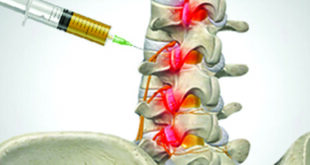 Statistics show that most people won’t make it through their adult years without suffering at least one bout of neck or low back pain, whether due to everyday muscle strain, an injury, or degenerative changes. Unfortunately, the pain becomes chronic for about 10% of patients, often turning into a debilitating problem that doesn’t improve with conventional medical treatment.
Statistics show that most people won’t make it through their adult years without suffering at least one bout of neck or low back pain, whether due to everyday muscle strain, an injury, or degenerative changes. Unfortunately, the pain becomes chronic for about 10% of patients, often turning into a debilitating problem that doesn’t improve with conventional medical treatment.
When your neck or back pain persists despite medical care, it’s time to try our interventional pain management options at Spine & Pain Institute of Florida. While we offer many effective therapies, one of the best for relieving back and neck pain is an epidural steroid injection. Read on to learn when you may benefit from this pain-relieving treatment.
Epidural steroid injections help these spine conditions
Epidural steroid injections specifically treat nerves in the spinal cord that are compressed due to problems with your spine. The conditions most often responsible for pinched and damaged nerves — and the conditions that may benefit from an epidural steroid injection — include:
Herniated discs
Each disc in your spine consists of a gel-like center surrounded by a tough, fibrous covering. When the covering becomes damaged, the gel-like center can herniate, pushing out through the weakened area and pressing against nearby nerves.
Bone spurs caused by osteoarthritis
When the vertebral facet joints are damaged by osteoarthritis, your body naturally responds by growing bone spurs. As these bony growths enlarge, they can pinch nerves.
Degenerative disc disease
Over time, the discs between vertebrae weaken and dehydrate, ultimately collapsing and either directly pinching nerves or leading to bone spurs that cause nerve problems.
Spinal stenosis
Spinal stenosis is a condition in which the spinal canal narrows and compresses the nerves. Stenosis is caused by all the conditions in this list, as well as other problems such as ligaments that thicken over time.
Spondylolisthesis
When you have spondylolisthesis, a vertebra slips out of position due to a defect or fracture in the bone. As a result, it compresses nerves and causes pain.
Depending on the location of the compressed nerves, you’ll have neck, shoulder, or lower back pain. Compressed nerves can also cause pain, tingling, and numbness along the affected nerve as it travels down your arm or leg.
The best example of this type of nerve pain is sciatica, which occurs when the sciatic nerve is pinched in the lumbar spine. Sciatica is well-known for causing severe, electric-shock type pain that radiates down your legs and sometimes into your feet.
Epidural steroid injections explained
Epidural steroid injections provide exceptionally effective pain relief for three reasons. First, they contain a corticosteroid, which is a potent anti-inflammatory medication. After the steroid is injected, it takes a little time to work, but before long, you’ll feel the pain ebb away as the medication reduces inflammation and swelling.
For most people, the pain relief lasts three months, but for some patients it can last a year or longer. There’s no way to predict your response because the results vary from one patient to the next.
The second reason epidural steroid injections alleviate nerve pain so well is because they’re injected into the epidural space. This space is a small area between the vertebrae and the protective membrane surrounding the spinal cord. As the injection is released, the medication infuses through the sac and flows around the targeted nerves, essentially bathing them in pain-relieving medication.
Finally, the injection is placed directly at the inflamed, painful nerves. We use real-time imaging, which allows us to see the vertebrae, nerves, epidural space, and the needle as we guide it into the spine. With this technique, we can precisely target the compressed nerves.
Here’s what to expect during an epidural steroid injection
The total epidural steroid injection procedure takes about 15-45 minutes, but the actual injection goes quickly. We numb the area with a local anesthetic, so you shouldn’t feel pain. Most patients do feel some pressure from the needle.
You should be able to walk around when the procedure is over. You’ll be monitored in the office for a short time, and then you can go home. It’s normal to have some soreness around the injection site, but you should be able to get back to your usual activities the same day.
If you only experience mild pain relief over the next few days, you may need to have one or two additional injections to achieve the full effect. These shots are spaced 1-4 weeks apart.
When back or neck pain persists despite conservative treatments, call our office at Spine & Pain Institute of Florida or schedule an appointment online. We’ll give you a thorough examination and determine if you’re a good candidate for an epidural steroid injection.
Spine and Pain Institute of Florida
833-513-7246 (PAIN)
FAX: (863)-333-4007
www.spiflorida.com
1417 Lakeland Hills Blvd. Ste 201
Lakeland, FL 33805
About Dr. Jassal
If you want an award-winning expert who offers the latest treatments to reduce pain, look no further than Navdeep Jassal, MD. At his practice, Spine & Pain Institute of Florida, located in Lakeland, Florida, Dr. Jassal treats a wide variety of pain types with comprehensive, personalized, evidence-based care.
Dr. Jassal started his medical education at the University of California, San Diego, where he earned his bachelor of science in biology. He then continued onto Ross University School of Medicine in Dominica, West Indies, completing his Doctor of Medicine degree. He completed his physical medicine and rehabilitation residency at the Zucker School of Medicine at Hofstra/Northwell in Great Neck, New York, and was elected chief resident during his final year. Dr. Jassal then rounded out his medical training with a pain medicine fellowship at the University of South Florida Morsani College of Medicine in Tampa, Florida.
Today, Dr. Jassal is certified by the American Board of Physical Medicine and Rehabilitation in both pain medicine and physical medicine and rehabilitation. He leverages his pain medicine specialty to help patients manage even the most complex pain.
Dr. Jassal treats chronic and acute pain, including cancer pain, neurological pain, and musculoskeletal pain. To do this, he offers each patient a personalized interventional treatment plan that may include tailored physical therapy, medication, and procedures like implantable spinal cord stimulators, intrathecal drug delivery systems, lumbar decompression, minimally invasive sacroiliac joint fusion and more.
When he’s not treating patients, Dr. Jassal extends his expertise to others. He serves as an assistant professor for the Department of Physical Medicine & Rehabilitation at the University of Central Florida as well as an assistant clinical professor for the University of South Florida’s pain medicine fellowship. He is also actively involved in research to uncover new, minimally invasive ways to treat spinal pain.
Dr. Jassal is an award-winning physician. In the Tampa edition of Top Doctor, he was voted the #1 Tampa pain physician in 2018 and was runner up in 2019. The University of South Florida named him Pain Faculty Attending of the Year in 2018. In addition, he recently won first place at the annual meeting of the American Society of Interventional Pain Physicians for his research and consistently presents at regional and national conferences on his outcomes.
 Central Florida Health and Wellness Magazine Health and Wellness Articles of the Villages
Central Florida Health and Wellness Magazine Health and Wellness Articles of the Villages



